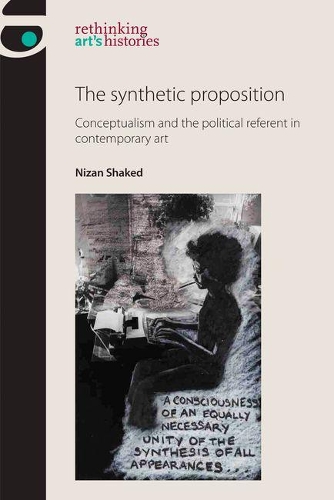
The Synthetic Proposition: Conceptualism and the Political Referent in Contemporary Art
(Paperback)
Available Formats
Publishing Details
The Synthetic Proposition: Conceptualism and the Political Referent in Contemporary Art
By (Author) Nizan Shaked
Manchester University Press
Manchester University Press
13th June 2017
United Kingdom
Classifications
Tertiary Education
709.04
Winner of Winner of the 31st annual Charles C. Eldredge Prize for Distinguished Scholarship in American Art (2019) 2019 (UK)
Physical Properties
Paperback
280
Width 156mm, Height 234mm
Description
The synthetic proposition examines the impact of Civil Rights, Black Power, the student, feminist and sexual-liberty movements on conceptualism and its legacies in the United States between the late 1960s and the 1990s. It focuses on the turn to political reference in practices originally concerned with abstract ideas, as articulated by Joseph Kosuth, and traces key strategies in contemporary art to the reciprocal influences of conceptualism and identity politics: movements that have so far been historicised as mutually exclusive. The book demonstrates that while identity-based strategies were particular, their impact spread far beyond the individuals or communities that originated them. It offers a study of Adrian Piper, David Hammons, Renee Green, Mary Kelly, Martha Rosler, Silvia Kolbowski, Daniel Joseph Martinez, Lorna Simpson, Hans Haacke, Andrea Fraser and Charles Gaines. By turning to social issues, these artists analysed the conventions of language, photography, moving image, installation and display. -- .
Reviews
Nizan Shaked's approach to Conceptual art is original, eloquent and informed by a quality of thought and scholarship that will set a new standard of excellence for work on this subject. Her grasp of the field is both capacious in its breadth and erudite in its depth and attention to artistic and historical detail. It is full of original insights all delivered to the reader in unusually graceful prose. This book promises to be a ground-breaker.
Adrian Piper
The premise of The Synthetic Proposition takes some of its cues from Joseph Kosuths ideas on art and philosophy. This coupled with an historical lens focusing specifically on marginalized groups such as the Black Panthers and the Gay Rights Movement beginning during the American Civil Rights era to help support the parallel trajectory of art during this period. A large component of Shakeds proposition is if Conceptual Art is a 1960s entity, then conceptualism is the natural offspring resulting from identity politics and early forms of feminist intersectionality paired with artistic practice. Shaked carefully lays out the distinctions and argues for another way of historicizing late 1960s to 1990s art practices, besides the more common dichotomy of those practicing art for arts sake and so-called political art.
Jasper Lastoria, ARLIS/NA (January 2018)
Author Bio
Nizan Shaked is Associate Professor of Contemporary Art History, Museum and Curatorial Studies at California State University, Long Beach
